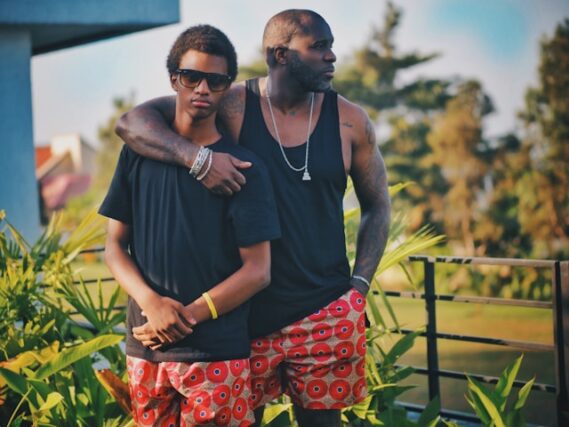Even when you love your parents, there’s stuff you wish you could say without it turning into a full-blown argument or emotional landmine.

Adult children often carry feelings and truths that never get spoken aloud. It’s not because they don’t matter, but because the reaction might just be too much to deal with. If they could talk to their parents about these things without it turning into a major drama, they would. Unfortunately, the high likelihood of conflict makes them think it’s not even worth it. If you have grown up kids, they’re likely wishing they could say these things to you.
1. “I’m not trying to hurt you when I set boundaries.”

It’s not about pushing you away or being disrespectful. It’s about protecting our mental space and energy as we try to navigate adult life. Boundaries aren’t walls, they’re just guidelines that help us feel safe in the relationship. Sometimes it feels like any line we draw turns into a guilt trip or cold silence, and that makes us pull back even more. We wish you’d understand that saying “no” doesn’t mean we love you less. It means we’re finally learning to take care of ourselves.
2. “You don’t have to agree with my life to respect it.”

We know you might not always get our choices—the job we took, the person we’re dating, the way we live. However, respect doesn’t mean approval, it just means letting us be who we are without constant criticism or reminders that you’d do things differently. When we feel like we’re constantly being judged, it pushes us to hide parts of our life from you. We’d rather share more, but only if we feel like we won’t be picked apart for simply being ourselves.
3. “Your advice sometimes feels more like control.”

We get it—you’ve lived more life and want to help us avoid mistakes. However, when advice turns into pressure or unsolicited lectures, it starts to feel like you don’t trust us to figure things out on our own. Sometimes we just want to vent or share what’s going on without being handed a step-by-step fix. Listening without jumping in can feel way more supportive than telling us what to do every time we speak.
4. “I’m not a kid anymore, even if I still mess up.”

Adulthood doesn’t mean perfection. Yes, we’re still figuring things out, but that doesn’t mean we want to be treated like we’re irresponsible or incapable every time something goes wrong. We wish you’d see our struggles as part of growing up, not as proof we still need to be parented the same way. Encouragement goes a lot further than lectures at this point in life.
5. “It’s hard to connect when everything turns into a guilt trip.”

We love you. We really do. However, when every missed call, skipped visit, or quiet phase turns into a guilt-fuelled comment about how we’ve changed or forgotten you, it makes us want to pull away more, not less. We’re trying to balance a lot: work, stress, our own relationships, and sometimes just our mental health. Please trust that we care, even if we’re not as available as we used to be.
6. “You don’t have to be perfect for us to love you.”

Sometimes it feels like you’re always trying to defend past choices or avoid accountability by reminding us you did your best, and we believe you did. But we can still feel hurt and want to talk about it without rewriting history or blaming you. We’re not looking to attack you. We just want honest conversations about the impact of certain things. Being able to talk about the hard stuff openly would actually make us feel closer, not more distant.
7. “It’s okay if we don’t have the same relationship you want.”

Maybe you always dreamed we’d be best friends or call every day, but we’re different people, and we might express connection in different ways. That doesn’t mean we don’t care. It just means we love differently than you do. Trying to force closeness usually backfires. Letting the relationship evolve into what feels natural for both of us gives it room to actually grow, not feel like an obligation we’re constantly falling short of.
8. “We’re still unpacking things from childhood, and that’s not your failure.”

Everyone has stuff to process from growing up, even in good families. It’s not a personal attack when we go to therapy or talk about childhood challenges. It’s just part of figuring out who we are now. Healing doesn’t mean blaming. It means looking at things with fresh eyes, even the stuff we buried for years. You didn’t mess up just because we’re still untangling it. It just means we’re ready to grow past old patterns.
9. “Sometimes we need emotional support, not just practical help.”

You’ve always been great at solving problems—dropping off food, helping with bills, giving advice. But sometimes what we need most is just someone to sit with us, listen, and say, “That sounds really hard.” We know you mean well, but going straight to fixing things can make us feel like we’re being brushed past instead of really heard. Sometimes, just hearing us out is the best kind of help there is.
10. “We want honesty, not sugar-coating, but still with kindness.”

We’re adults now, and we can handle tough truths, but tone matters. Harsh criticism disguised as “just being honest” still stings, especially when it’s not asked for. We appreciate realness, but we also appreciate compassion. We’re more likely to listen if it feels like your honesty is coming from a place of care, not frustration or judgment.
11. “Please stop comparing us to other people.”

It hurts when you hold us up against our siblings, cousins, or your friend’s ‘perfect’ kid. Even if you don’t mean it cruelly, those comments stick, and they quietly tell us we’re not enough as we are. We want to feel valued for our own path, not like we’re in a constant competition. The best way to help us thrive is to cheer us on for who we are, not who someone else became.
12. “We sometimes need space, and that doesn’t mean we’re mad at you.”

Life gets overwhelming. Sometimes we just need quiet, time alone, or space to think. It’s not a silent protest or a personal dig. It’s just us managing our own mental bandwidth. Taking space isn’t about punishing you or shutting you out. It’s about keeping ourselves steady. When we know we can take time without it turning into drama, we’re much more likely to come back openly and willingly.
13. “It’s hard to be vulnerable when past conversations didn’t feel safe.”

We may not open up easily, not because we’re hiding things, but because past experiences left us feeling unheard, criticised, or shut down. Over time, that creates emotional distance. We’d love to share more, but for that to happen, we need to know we won’t be met with defensiveness, sarcasm, or unsolicited advice. Vulnerability needs softness, not correction or debate.
14. “We want a relationship with you, not a role we’re expected to play.”

Being your child doesn’t mean we’re stuck in a script where we owe you constant validation, attention, or obedience. We want a real relationship, based on mutual respect—not guilt, hierarchy, or expectations we didn’t agree to. We’re not kids anymore. We want to know you as people, and we want you to know us, not just as your son or daughter, but as full-grown humans still learning how to relate in new ways.




